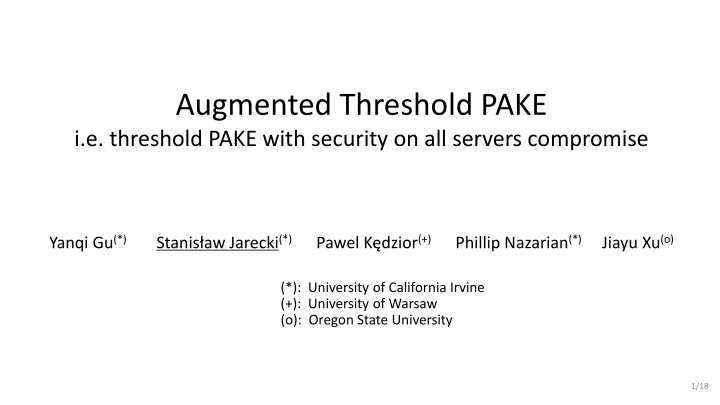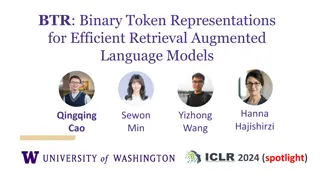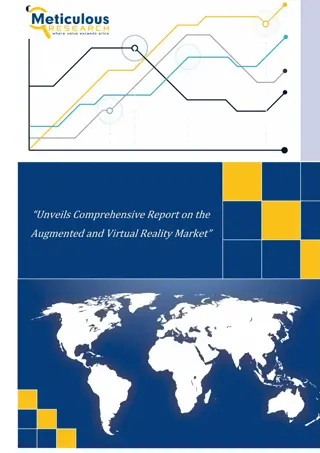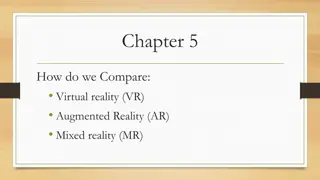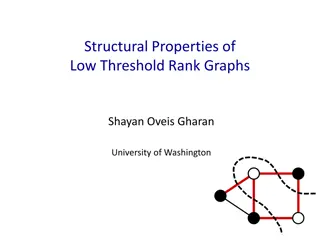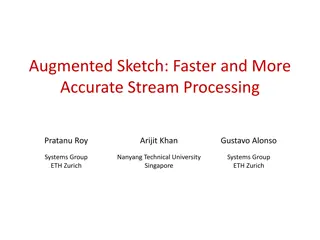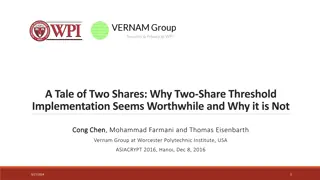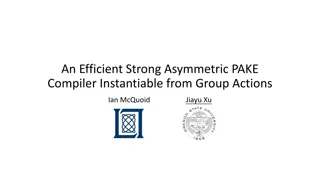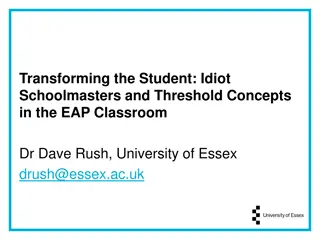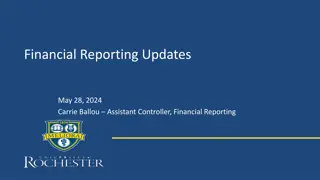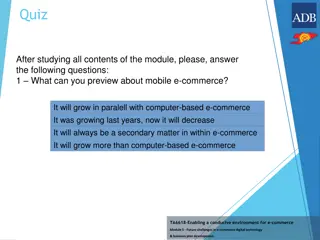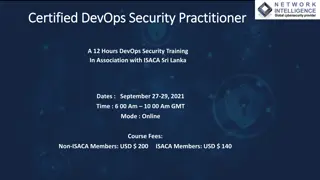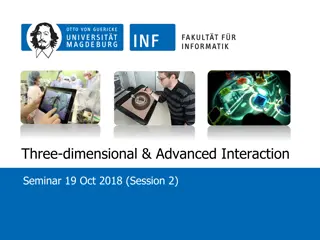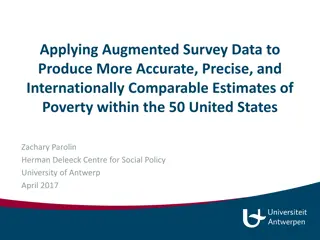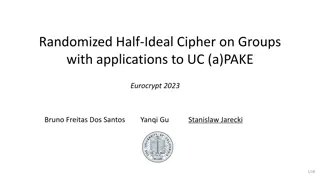Augmented Threshold PAKE - Security and Implementation
Augmented Threshold PAKE enhances security against server compromise by introducing multi-party computation. Various protocols such as OPAQUE and aPAKE are discussed, emphasizing the importance of security measures to prevent offline dictionary attacks on compromised servers.
Download Presentation

Please find below an Image/Link to download the presentation.
The content on the website is provided AS IS for your information and personal use only. It may not be sold, licensed, or shared on other websites without obtaining consent from the author.If you encounter any issues during the download, it is possible that the publisher has removed the file from their server.
You are allowed to download the files provided on this website for personal or commercial use, subject to the condition that they are used lawfully. All files are the property of their respective owners.
The content on the website is provided AS IS for your information and personal use only. It may not be sold, licensed, or shared on other websites without obtaining consent from the author.
E N D
Presentation Transcript
Augmented Threshold PAKE i.e. threshold PAKE with security on all servers compromise Yanqi Gu(*) Stanis aw Jarecki(*) Pawel K dzior(+) Phillip Nazarian(*) Jiayu Xu(o) (*): University of California Irvine (+): University of Warsaw (o): Oregon State University 1/18
PAKE: Password Authenticated Key Exchange [BM92, ,BPR00,BMP00, ,GL01,KOY01, ,CHKLM05, ] ?? ?? PAKE ? = ? ( $) if ?? = ?? else ?,? independent ? ? Ada Charles 2/18
augmented PAKE (aPAKE) [Jablon97, ,GMR06, ,BP13, ,Shoup20,GJK21, ] Server Initialization: on input pw, compute a `hashed password , ?? = H(??) H : one-way hash ?? ?? aPAKE ? = ? ( $) if H(??) = ?? else ?,? independent ? ? User Server Benefit of aPAKE: server compromise leaks ?? = H 1( ??) only via brute-force search (a.k.a. offline dictionary attack ) 3/18
OPAQUE strong augmented PAKE (saPAKE) [JKX 18,BJX 19,JKX 21,RX 24] IETF competition winner Server Initialization: on input pw, pick random `salt ?, set ?? = ???? ? : keyed one-way hash ?? r, ?? saPAKE ? = ? ( $) if ???? = ?? else ?,? independent ? ? User Server Benefit of saPAKE: offline dictionary attack on server compromise cannot be precomputed Password-over-TLS (de-facto internet authentication standard) = poor man s version of saPAKE: Server holds (skS,pkS), and Server s authentication to User is based on pkS and relies on PKI: phishing attack leaks pw in the clear if PKI fails (e.g. cert from unreliable Cert Authority, wrong URL, ) compromise on the Server leaks pw s in the clear (e.g. memory/cache dump, ) 4/18
OPAQUE strong augmented PAKE (saPAKE) [JKX 18,BJX 19,JKX 21,RX 24] IETF competition winner Server Initialization: on input pw, pick random `salt ?, set ?? = ???? ? : keyed one-way hash ?? ?, ?? saPAKE ? = ? ( $) if ???? = ?? else ?,? independent ? ? User Server Benefit of saPAKE: offline dictionary attack on server compromise cannot be precomputed Can we make it stronger? Can we eliminate offline dictionary attack on Server compromise? Yes, with multi-party computation (MPC) implementation of Server, i.e. Threshold PAKE ! 5/18
saPAKE vs. threshold PAKE (tPAKE) Server Initialization: on input pw, pick random `salt ?, set ?? = ???? ?? ?, ?? saPAKE learns ?, ?? only offline password tests ? = ? if ???? = ?? (otherwise k and k are indep.) ? ? User Server Threshold PAKE (t-PAKE): Server s code is MPC-emulated by n parties holding secret-sharing s1, ,sn of Server s state corruption of up to t < n servers leaks no information t-PAKE [FK 00,MSJ 02,GR 03,ACFP 05, ] secret-shares symmetric PAKE (s1, ,sn) is a secret-sharing of password pw corruption of (t+1) servers leaks pw Our goal: Augmented t-PAKE (at-PAKE): corruption of (t+1) servers leaks ?, ?? allows only offline pwd tests we want UC model for at-PAKE (prior t-PAKE models were game-based, e.g. assumed $ pw) 6/18
augmented threshold PAKE (at-PAKE) Initialization: on User s input pw, servers output sharing [?, ?? = ???? ] ?? [?, ??] < t corrupt no info at-PAKE S1 S2 ? = ? if ???? = ?? (otherwise k and k are indep.) ? (t+1) corrupt only offline password tests ? User Sn S3 Threshold PAKE (t-PAKE): Server s code is MPC-emulated by n parties holding secret-sharing s1, ,sn of Server s state corruption of up to t < n servers leaks no information t-PAKE [FK 00,MSJ 02,GR 03,ACFP 05, ] secret-shares symmetric PAKE (s1, ,sn) is a secret-sharing of password pw corruption of (t+1) servers leaks pw Our goal: Augmented t-PAKE (at-PAKE): corruption of (t+1) servers leaks ?, ?? allows only offline pwd tests we want UC model for at-PAKE (prior t-PAKE models were game-based, e.g. assumed $ pw) 7/18
augmented threshold PAKE (at-PAKE) Initialization: on User s input pw, servers output sharing [?, ?? = ???? ] ?? [?, ??] < t corrupt no info at-PAKE S1 S2 ? = ? if ???? = ?? (otherwise k and k are indep.) ? (t+1) corrupt only offline password tests ? User Sn S3 1. Should all servers establish key k =k with the User? We split servers into auxiliary and target servers: Target server (a.k.a. Gateway Server in some prior t-PAKEs) establishes a shared key with the User Auxiliary servers exist only to facilitate authentication (and make it harder to corrupt r,hpw) 8/18
augmented threshold PAKE (at-PAKE) Initialization: on User s input pw, servers output sharing [?, ?? = ???? ] ?? [?, ??] < t corrupt no info at-PAKE AS1 AS2 ? = ? if ???? = ?? (otherwise k and k are indep.) ? (t+1) corrupt only offline password tests User ASn ? AS3 1. Should all servers establish key k =k with the User? We split servers into auxiliary and target servers: Target server (a.k.a. Gateway Server in some prior t-PAKEs) establishes a shared key with the User Auxiliary servers exist only to facilitate authentication (and make it harder to corrupt r,hpw) 2. Initialization? We assume User initializes all (AS1, ,ASn,TS) servers 3. Instance synchronization? All auxiliary servers AS1, ,ASn must run on the same session identifier (sid) 4. Explicit authentication? Only TS learns if attempt successful TS 9/18
augmented threshold PAKE (at-PAKE) Initialization: on User s input pw, servers output sharing [?, ?? = ???? ] ?? [?, ??] < t corrupt no info at-PAKE AS1 AS2 ? = ? if ???? = ?? (otherwise k and k are indep.) ? (t+1) corrupt only offline password tests User ASn ? AS3 Further benefits: one round interaction User ASi s don t communicate: they can be different services or devices black-box constructions, can interface to any saPAKE or AKE for User no change on TS, interfaces with OPAQUE (saPAKE), TLS (AKE), even password-over-TLS admits proactive security admits multiple TS s Auxiliary Servers (ASi s) can service arbitrary number of user accounts with O(1) state TS ASi s, followed by saPAKE/AKE protocol User TS TS subprotocol 10/18
OPAQUE vs. WtS aPAKE-to-saPAKE compiler [JKX18] OPAQUE [JKX18] WtS compiler [JKX18] = OPRF + AuthEnc + AKE OPRF = PRF with oblivious evaluation protocol = OPRF + aPAKE ? $ ?? ? ????(??) ?? ?????.????(??) ? $ ?? ? ????(??) ?,A , ?,B ???.?? ??? ??????(a,B) ?? (?, ??) ?? (?,???,b,A) ?? ?? User Server User Server ? ? OPRF OPRF ?? ?? ??? (a,B) ??????(???) (a,B) ?? ?? (b,A) aPAKE (/w PFS) ? ? AKE (/w KCI) ? ? OPAQUE OPAQUE can use weaker primitive (AKE vs. aPAKE) WtS allows Server to learn first if pw =pw vs. WtS KCI = key compromise impersonation [security] = perfect forward secrecy (= includes key confirmation messages) 11
Augmented t-PAKE (at-PAKE): replace OPRF with t t- -OPRF t- t- = OPRF + AuthEnc + AKE t-OPRF = PRF with oblivious threshold evaluation protocol (Servers hold sharing [K] of PRF key K) OPRF WtS compiler [JKX18] t- = t-OPRF + aPAKE t- OPAQUE [JKX18] [?] ? $ ?? ? ????(??) ?? ?????.????(??) [?] ? $ ?? ? ????(??) ?,A , ?,B ???.?? augmented PPSS ??? ??????(a,B) [?],???,b,A ?? (?,???,b,A) [?], ?? ?? (?, ??) saPAKE [=OPAQUE] ?? ?? User Server ASi s User Server ASi s [?] ? [?] ? t- t- OPRF OPRF ?? ?? pwd over TLS ??? (a,B) ??????(???) (a,B) ?? ?? TS TS (b,A) aPAKE (/w PFS) ? ? AKE (/w KCI) ? ? Further options: tOPRF augmented Password-Protected SS [DJKKNX 23] weaker assumptions, but not proactive OPAQUE OPAQUE can use weaker primitive (AKE vs. aPAKE) WtS can allow Server to learn first if pw =pw tOPRF threshold Partially Oblivious PRF ASi s can use single [K] sharing for all (User,TS) pairs vs. WtS Disclaimer: Versions of this protocol appeared before [FK 00,JKK 14,JKSS 16,JKKX 17, ], but: prior analysis showed t-PAKE, not at-PAKE it was game-based, not UC 12
Augmented t-PAKE (at-PAKE): replace OPRF with t t- -OPRF t- t- = OPRF + AuthEnc + AKE t-OPRF = PRF with oblivious threshold evaluation protocol (Servers hold sharing [K] of PRF key K) OPRF WtS compiler [JKX18] t- = t-OPRF + aPAKE t- OPAQUE [JKX18] [?] ? $ ?? ? ????(??) ?? ?????.????(??) [?] ? $ ?? ? ????(??) ?,A , ?,B ???.?? augmented PPSS ??? ??????(a,B) [?],???,b,A [?], ?? saPAKE [=OPAQUE] ?? ?? User Server ASi s User Server ASi s [?] ? [?] ? t- t- OPRF (P)OPRF ?? ?? pwd over TLS ??? (a,B) ??????(???) (a,B) ?? ?? TS TS (b,A) aPAKE (/w PFS) ? ? AKE (/w KCI) ? ? Further options: tOPRF augmented Password-Protected SS [DJKKNX 23] weaker assumptions, but not proactive tOPRF threshold Partially Oblivious PRF ASi s can use single [K] sharing for all (User,TS) pairs Disclaimer: Versions of this protocol appeared before [FK 00,JKK 14,JKSS 16,JKKX 17, ], but: prior analysis showed t-PAKE, not at-PAKE it was game-based, not UC 13
Augmented t-PAKE (at-PAKE): replace OPRF with t t- -OPRF t- t- = OPRF + AuthEnc + AKE t-OPRF = PRF with oblivious threshold evaluation protocol (Servers hold sharing [K] of PRF key K) OPRF WtS compiler [JKX18] t- = t-OPRF + aPAKE t- OPAQUE [JKX18] [?] ? $ ?? ? ????(??) ?? ?????.????(??) [?] ? $ ?? ? ????(??) ?,A , ?,B ???.?? augmented PPSS ??? ??????(a,B) [?],???,b,A [?], ?? saPAKE [=OPAQUE] ?? ?? User Server ASi s User Server ASi s [?] ? [?] ? t- t- OPRF (P)OPRF ?? ?? pwd over TLS ??? (a,B) ??????(???) (a,B) ?? ?? TS TS (b,A) aPAKE (/w PFS) ? ? AKE (/w KCI) ? ? Online Attacks: as U* against TS, needs to interact with t+1 ASi s as T* against U, needs to: interact as U* with (t+1) ASi s (or as t+1 ASi* with U 14
Augmented t-PAKE (at-PAKE): replace OPRF with t t- -OPRF t- t- = OPRF + AuthEnc + AKE t-OPRF = PRF with oblivious threshold evaluation protocol (Servers hold sharing [K] of PRF key K) OPRF WtS compiler [JKX18] t- = t-OPRF + aPAKE t- OPAQUE [JKX18] [?] ? $ ?? ? ????(??) ?? ?????.????(??) [?] ? $ ?? ? ????(??) ?,A , ?,B ???.?? augmented PPSS ??? ??????(a,B) [?],???,b,A [?], ?? saPAKE [=OPAQUE] ?? ?? User Server ASi s User Server ASi s [?] ? [?] ? t- t- OPRF (P)OPRF ?? ?? pwd over TLS ??? (a,B) ??????(???) (a,B) ?? ?? TS TS (b,A) aPAKE (/w PFS) ? ? AKE (/w KCI) ? ? Offline Dictionary Attacks (ODA): aPPSS or env+AKE: ODA enabled by compromise of t+1 ASi s t(P)OPRF + saPAKE: must also compromise TS t(P)OPRF + aPAKE: allows precomputation after compromise of t+1 ASi s 15
threshold OPRF: key enabling tool Initialization: [K] $ ? [K] S1 t-OPRF S2 ? = FK? User Sn S3 How many U should be exactly t+1, and these ASi instances should run on the same sid Prior UC t-OPRF [JKKX 17] was ambiguous: no enforcement of consistent sid on (t+1) instances of t-OPRF corresponding to one Fk( ) computation simulator doesn t know which ASi queries pertain to evaluation of one argument counterexample, assuming t=1 and n=3: ASi interactions allow for one Fk( ) computation? 1. U* interacts with S1,S2,S3, evaluating Fk( ) on x with {S1, S2} and on x with S3, 2. simulator cannot tell which Si instances go into one Fk( ) evaluation, but say it guesses it was {AS1,AS3} 3. the environment allows another t-OPRF session S2 , and U* executes it on x in the real world, U* can compute Fk(x) from {S1,S2} and Fk(x ) from {S3,S2 } in the ideal world, sessions are partitioned as {S1,S3} and {S2,S2 }, so only one Fk( ) evaluation allowed 16/18
threshold OPRF: fixing t-OPRF protocol of [JKKX17] Initialization: [K] $ ? [?] S1 t-OPRF S2 ? = ?? ? User Sn S3 ??? = ?(?)?(slightly simplified) ? = ?(?)? (?) pick r $ (share ??of K) s.t. ? = ? ?(?? ??) ??= ??? 1/?)?? ? = ? ?( ?? = ? ?(?(?)??)?? Si User ?? s : interpolation coef. s for set T, |T|=t+1 Problem: U* can send ??= ???for ri $ and still compute y = ?(?)? ?? s are random group elements: SIM cannot tell which ?? s pertain to evaluation of ??( ) on same x Fix (assumes DDH): Si s hold zero-sharing ?1, ,??, i.e. ? ?(?? ??) = 0, and Si s response is ??= ??? ? ???,??? 17/18
questions / open problems / follow-up projects 1) Augmented threshold PAKE (at-PAKE) Proposed model+solutions: Two disassociated modules (AuxiliaryS stage + TargetS stage) Technically: computing rw = t-OPRF(pw) in any AuxiliaryS stage menas you never need to use pw again! Same with adaptive corruption of User s client machine (which we, conveniently, don t model ) Can we tighten this up ? Protocols possible but they would be more complex: would it be worth it? 2) Threshold OPRF (t-OPRF): Adaptive and proactive security for t-OPRF? [recent work: adaptively secure t-OPRF in AGM] Applications of t-OPRF to other MPC/threshold computation? applications of the implicit binding by blinding technique? 18/18
